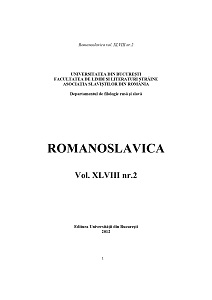Reprezentări ale realului în opera lui Viktor Pelevin
Representations of reality in Viktor Pelevin's work
Author(s): Florentina MarinSubject(s): Novel, Short Story, Russian Literature, Psychoanalysis, Theory of Literature, Sociology of Literature
Published by: Editura Universităţii din Bucureşti
Keywords: Viktor Pelevin; Nika; Buddha's Little Finger; consciousness; collective unconsciousness; Carl Jung; human archetypes; simulacrum;
Summary/Abstract: The present article is an analysis of the mental representations of reality in Viktor Pelevin’s short story Nika and the novel Buddha's Little Finger. The writer demonstrates the purely subjective manner in which humans perceive and interpret the surrounding world and the events that happen in their lives. The subjectivity of their interpretations is due to some particular factors: on the one hand, the natural or innate factor present in each individual, which consists of the perceptive abilities and the human archetypes which exist in the collective unconsciousness. On the other hand, this subjectivity is closely related to the social background of the individual and consists of beliefs, traditions, mentality, social rules, ideology etc. As revealed from Pelevin’s writings, the mental representations of reality arise from the conjunction of these two factors. The individual is often surrounded by his false/incorrect interpretations which eventually become simulacra that change and reshape his “universe of representations”. The writer points at the heroes’ superficial and illusionary representations by ironically denying the existence of any reality, as shown in the novel Buddha's Little Finger. Once more we have to point out that the writer does not deny reality as an external condition of his characters, but the false conceptions and misinterpretations which govern people’s lives.
Journal: Romanoslavica
- Issue Year: XLVIII/2012
- Issue No: 2
- Page Range: 175-182
- Page Count: 8
- Language: Romanian

